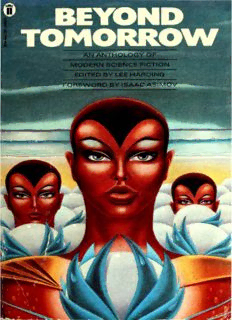Table Of ContentBEYOND TOMORROW
Beyond Tomorrovv
An Anthology of Modern Science Fiction
Edited by LEE HARDING
Foreword by ISAAC ASIMOV
NEW ENGLISH UBRARY
TIMU MIRRGll
Johnson
For Robin
who moves mountains.
First publishienAd us tralia by Wren Publishing Pty Ltd
in 1976t oco mmemorate the 33rWdo rldSci ence Fiction
Conventiheonld in Melbourne, August 1975
<C This anthology, Lee l_larding 1976
•
FIRST NEL PAPERBACK EDITION JULY 1m
•
Ooadltlons of sale: This book is solsdu bjectto the conditithaton itahal l not, byway
oftra de oro therwise, be lent,re-so ldhired, outo,r o therwise circulated without the
publisher'sp riorc onsenint any form ofb inding orco ver·o thethanr that in which it ia
publishedan d without a similar condition including this condition being impoeed OD
the subsequent purchaser.
NEL Books an publish«l by
NtJW English Library Limitedfrom Bamard'1 Inn, Holbom, London EC1N a}R.
MtJ/k and printed in Great Britain by Hunt BamalYl Printing Ltd., AYiesbury, Budu.
45003191 8
Contents
BAD NEWS GOOD
Foreword THE AND THE 7
Isaac Asimov
IDIOT STICK Damon Knight 11
Ursula
NINE LIVES Le Guin 24
THE CO:MRMUTE Philip K. Dick 47
THE OATH James Blish 59
BID John Baxter 7
TAKEOVER 7
CO:MES NOW POWER Roger Zelazny
THE
94
Ll UG Tony Morphett 100
'ITERB
MO HITION'S KITIONS 117
TIIER. LI'l*l'UL
Cordwainer Smith
SONG BEFORE SUNSET David Grigg 138
A
S ANCE Robert Silverberg 149
UND
JOSE Brian 163
THE OH IN Aldiss
THE MAN WHO CAME EARLY Poul Anderson 172
HIM LORD Gordon Dickson 194
CALL
J.
THE GARDEN OF TI:ME G. BaJJard 213
Acknowledgements 221
The Bad News and the
Good
A foreword by Isaac Asimov
I have some bad news for you and some good news.
The bad news is You may have missed the Golden Age
this.
of Science Fiction during all the twenty years that it was b g
wnin
up the news-stands in the United States.
The good news You can start having it now.
is this.
If any of you who are reading these words happened to have
died during the Forties and Fifties (I suppose not many of you
have) then the bad news is permanent. You've missed the Golden
Age forever. For most of you readers, who are still alive, or have
been born since, the good news is permanent. Just gobble up the
Golden Age till your reading capacity is full the stuff starts
so
leaking out at the medulla oblongata.
Here's what happened -
Back in 1926, a magazine called Amazing Stories appeared.
It was the first periodical ever to be devoted exclusively to science
fiction. There had been plenty of science fiction before, even
highly regarded science fiction (think of H. G. Wells and Jules
Verne), but they had been written by a relatively few authors at
irregular intervals.
With the coming of Amazing Stories and, after a few years,
two or three more such magazines, it became necessary to find
enough science fiction each month to fill them.
7
There just ugh
wam't nearly eno really well-written science
fiction produced to fill those magazines and that was the luckiest
thing in the world - for the magazines were forced to accept
whatever they could get. This meant that yowigstcrs, fiendishly
the field, had a chance sell lame in
interested in to their and
experienced writings, and that odd literary creature, 'the science
fiction writer', into b�ing.
came
Very of ten were not 'authors' in the literary
they sense, didn't
t be, couldn't ever be. Th only to e
wan to ey wanted be scienc
fiction writers. If their stories lacked stylistic polish, they
possesdse
the crude vigour of unbridled and undisciplined imaginations.
That a fascinating time to live in. I old
was was nine years
when, in 1929, I discovered the field myself.
Yet, however lusty the childhood of field time came
the was, a
when it had to mature, and for that a master was needed, strong
enough and fervent enough to see that this would t pass.
come o
That master was John W. Campbell, Jr, who had, himseH,
throughout the early 1930s, been one of the giants of i
magaz ne
science fiction, writing stories of vast la adventure, in a style
ga ctic
as un lish vigour as an imagination
po ed a crude, as unbridled and
,
in
could be found anywhere else field.
undisciplined, as the
But, largely unknown to the fans, he had been quietly chang
ing. ll had a capacity for for or
Campbe development and two
three years he had been publishfug thought-provoking mood
pieces under the pseudonym of Don Stuart, lim g with
A. c axin
the novella Who Goes There? may very
which well be the best
science fiction story ever written.
Then in 1938 Campbell b e to
ecam edi r of Astounding Stories�
which he promptly renamed Astounding Science Fiction. It was
his intention to make the field grow t He was going to
wi h him.
W.
force science fiction writers to cease being John Campbells
and to begin to Don A. Stuarts.
be
Out would go the cliches of science fiction, all the world
stale
of mad scientists and cl gly murderous robots and
ankin card
board monsters from outer space and stultifying lectures
on
distorted science. In would come scientists and engineers
who
talked like scientists and engineers, encountering dangers that
might just take place in the real world and finding solutions that
showed a respect for real science.
Campbell was ruthless. He would not accept the stories of the
old sort by had succeaful, of
men who hitherto been and many
the big-name writers of the 1930s had to leave the field. He
would, on other hand, accept stories from unkn writers
the own
who seemed to be on the right track even if, at first, only distantly
and
haltingly.
8

